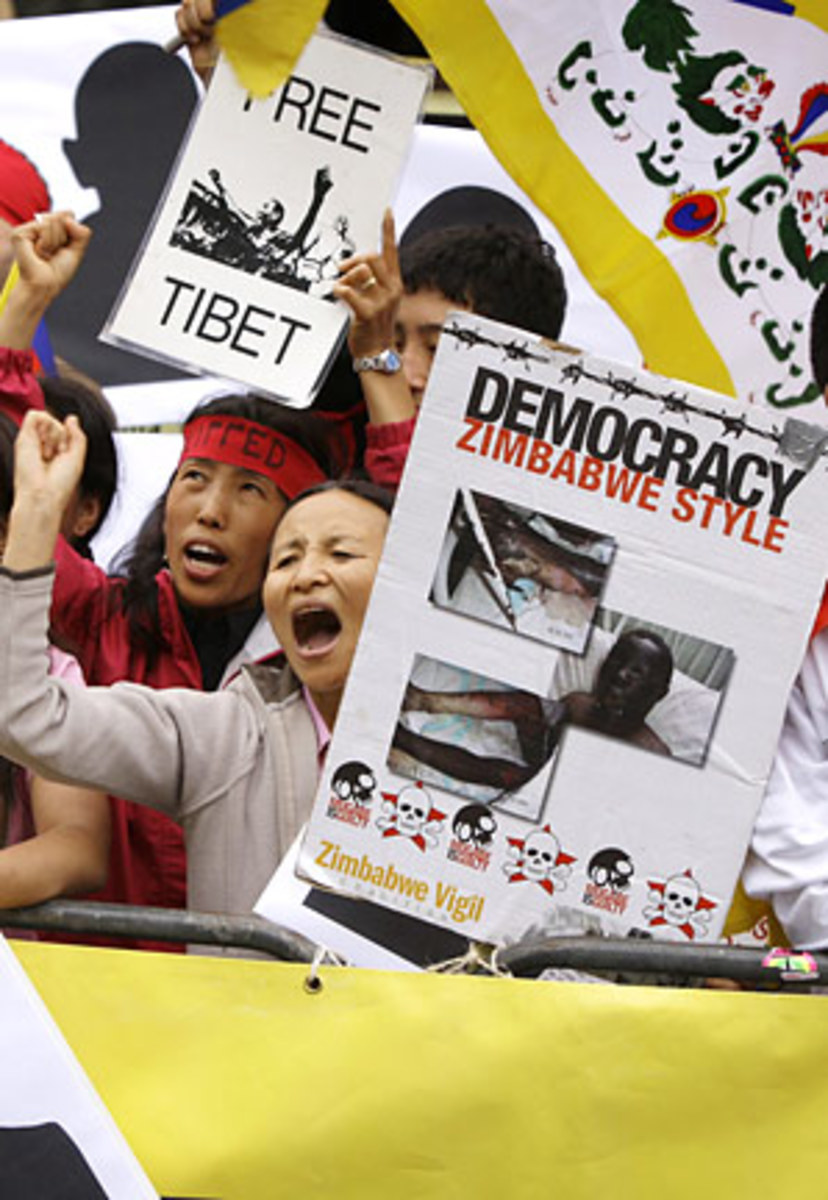Perspective: The Olympics, political unrest always go hand in hand
There are 205 countries represented here and almost all are oppressors or oppressed and often both. The host country, after centuries of being conquered and colonized, oppresses its own people, persecuting dissidents, imprisoning critics, destroying the culture of its ethnic minorities. It also supports the world's outlaw regimes, all of whom are also represented here.
For a time, there was talk that right-thinking nations should boycott these Games. Trouble is, it's sometimes difficult to tell the right-thinking ones from the wrong-thinking ones.
Last week, U.S. Representatives Allyson Schwartz (D-Penn.) and Bill Shuster (R-Penn.), co-chairs of the House Georgia Caucus, announced they would introduce a resolution calling on the IOC to take the 2014 Winter Olympics away from Sochi, Russia. They feel that its invasion of Georgia makes Russia an unsuitable host for the Games. Never mind that the IOC is not influenced, much less bound, by a resolution of the U.S. Congress, what country would be a suitable host for the Games? More countries are bound to invade other countries between now and 2014.
Schwartz and Shuster's gesture is just that, of course, a gesture, like boycotts of Olympic Games. The U.S. boycott of the 1980 Moscow Games didn't force the U.S.S.R. from Afghanistan, and the Soviet boycott of the 1984 Los Angeles Games didn't influence U.S. foreign policy. The idea, proposed by some human-rights activists, that the U.S. and other nations boycott the Beijing Games was as unrealistic as demanding the U.S. no longer import goods from China or that U.S. companies no longer do business in China. A more meaningful expression of global disapproval would be to banish an offending country from the Games.
From 1970 to 1991, South Africa was barred from the Olympics. The IOC was complying with United Nations Resolution 3324 (XXIX): "Reaffirming that the policies and practices of apartheid constitute a crime against humanity... [the U.N.] requests all Governments: To prohibit all cultural, educational, scientific, sporting and other contacts with the racist regime and with organizations or institutions in South Africa which practice apartheid."
In the case of South Africa, the IOC followed the U.N.'s lead. According to the IOC Charter, "The goal of Olympism is to place sport at the service of the harmonious development of man, with a view to promoting a peaceful society concerned with the preservation of human dignity." The Charter continues, "Any person or organization belonging in any capacity whatsoever to the Olympic Movement is bound by the provisions of the Olympic Charter." The IOC could now sanction other countries, as it did for South Africa's "crimes against humanity" that are still being committed, thus following the lead of the U.N. and other international political bodies.
The European Union has sanctioned Burma, and banned the granting of visas to various members of the brutal military regime that rules the country. Had the 2008 Games been in Europe, Burma's Minister of Sport, Brig.Gen. ThuraAye Myint, could not have marched behind the Burmese flag in the Opening Ceremony, as he did in Beijing alongside the six athletes from his country.
The U.N. has "condemned continued violent attacks on civilians, including displaced persons, refugees, women, children, the elderly and humanitarian workers" in the Darfur region of Sudan. Many human rights advocates, citing China's economic and military ties to the genocidal policies of the Sudanese government, called for a boycott of the Beijing Games, but there were no calls to ban Sudan itself from the Games. Nine Sudanese athletes competed in Beijing, and the IOC could have cited the U.N. statements in banning Sudan from the 2008 Games.
Zimbabwe has pulled out of next year's International Cricket Council Twenty20 World Cup after England and other countries argued that Zimbabwe should not be permitted to participate. The sport's governing body in Zimbabwe has been accused of being aligned with President Robert Mugabe's regime, which has ruthlessly and violently maintained power despite losing a recent election.
Neither Burma nor Sudan nor Zimbabwe is as sports-mad as South Africa and making them pariahs in the sports world would not do to them what such humiliation did to South Africa, but it would show that the Olympic ideals of "promoting a peaceful society" and "the preservation of human dignity" have some meaning.
How to decide to sanction a country? The number of offending countries listed by Human Rights Watch is nearly the same as delegations marching in Opening Ceremony in Beijing. Who among us can judge? Those who ask that question assume it to be rhetorical, but it isn't. It is asked by those abdicating responsibility. Someone can judge: the world can judge. Like the U.N., the IOC is a collection of delegates, representing the countries of the world. They and we, as a global community, can declare that government-sanctioned mass murder, euphemistically called "ethnic cleansing," will preclude you from participating in our quadrennial celebration of brotherhood and fair play.
Is it fair to punish athletes for the acts of their government? Unlike, say U.N. ambassadors (or IOC or National Olympic Committee members), who are by definition from the ruling classes, athletes are from all classes. Athletes do not make policy.
So, rather than bar the athletes from Burma, Sudan and Zimbabwe from competing, perhaps we should allow them to compete as "IOP" or Independent Olympic Participants, the designation used in 1992 for athletes from Yugoslavia who could not compete as a team because of U.N. sanctions.
By allowing athletes from these countries to compete in the Olympics under their native flags, the IOC has done them and us a disservice. During any medal ceremony, everyone is asked to rise during the playing of the national anthem of the gold medalist. How are we to behave when Sudan's flag is raised and its anthem played?






